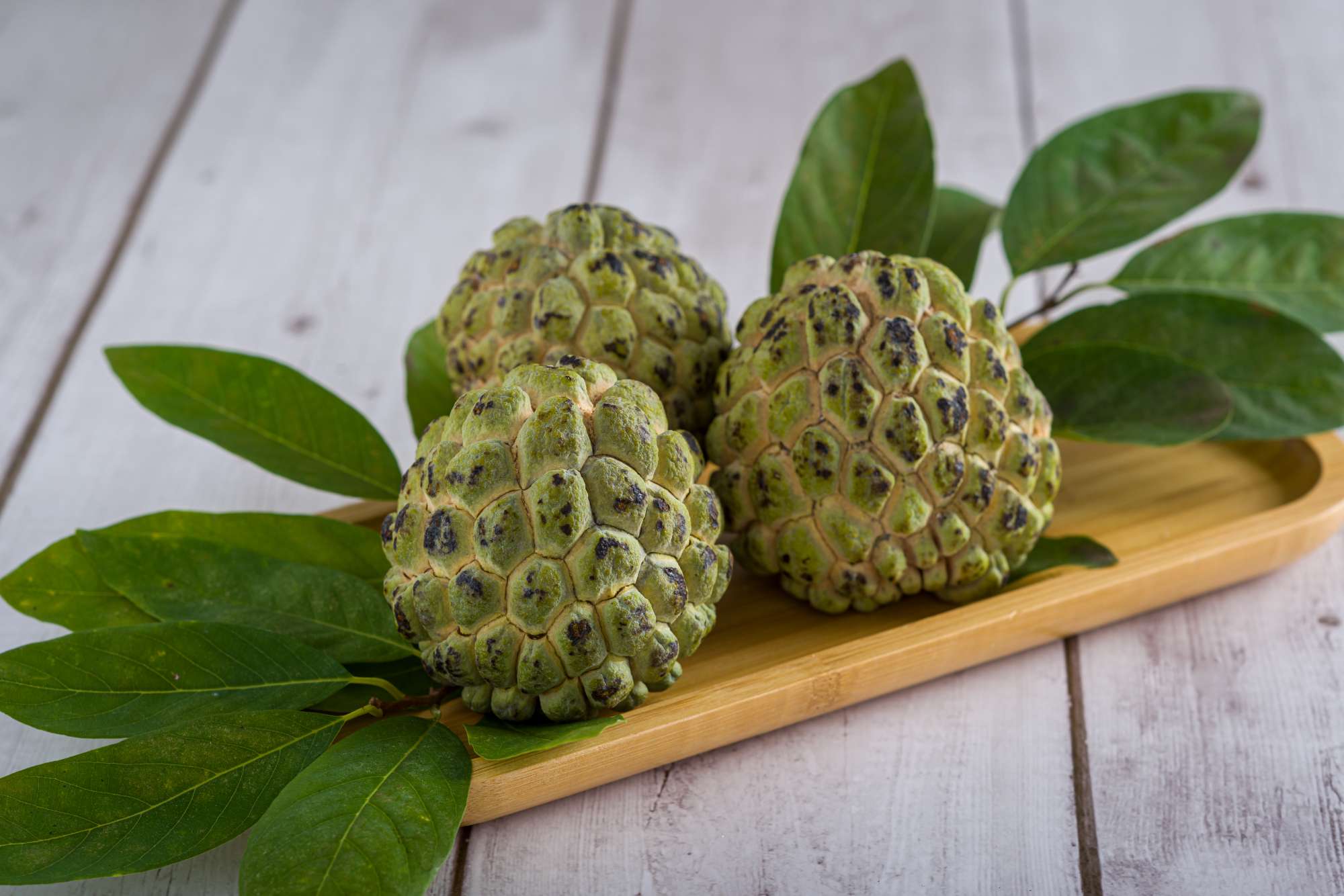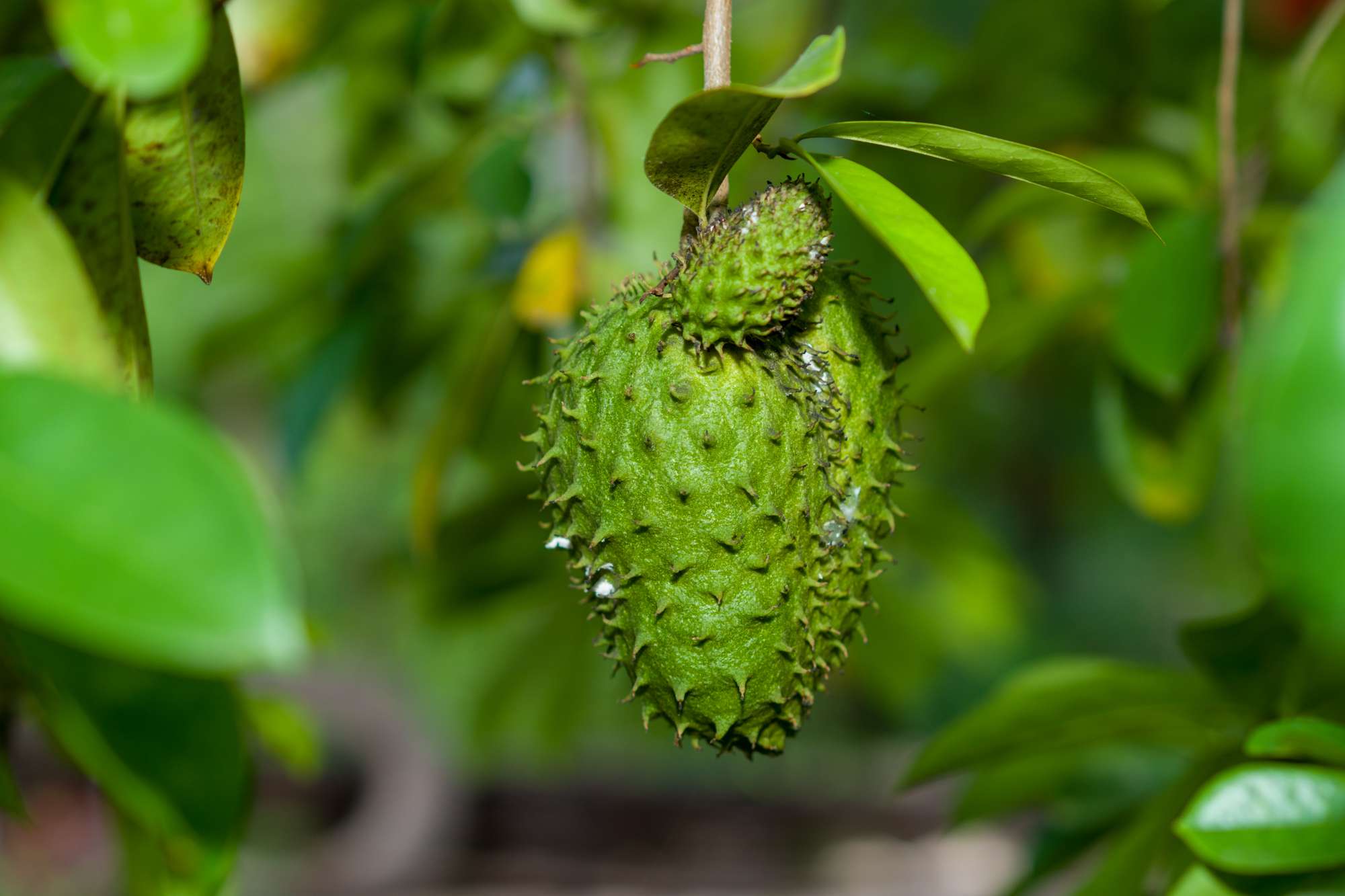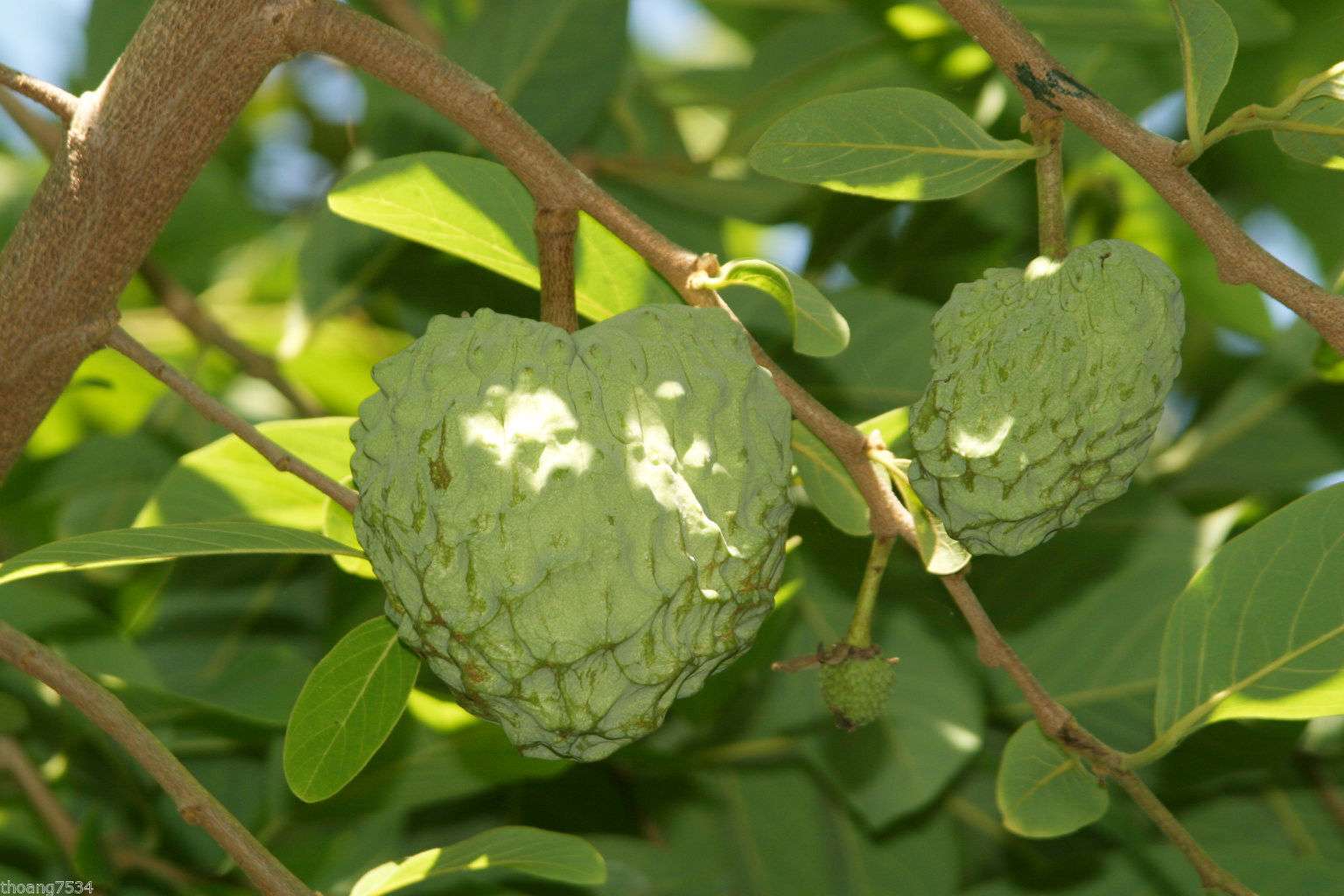Annona Cherimoya contains a lot of protein, and rich of thiamine, B6, calcium, iron and phosphorus
Annona Cherimoya contains a lot of protein, and rich of thiamine, B6, calcium, iron and phosphorus
Cherimoya loaded with beneficial nutrients that may support your mood, immunity, and digestion. In particular, the protein in Cherimoya creates a nutritional difference between this fruit and other fruits. This unique fruit can be a great addition to a nutrient-dense, balanced diet.
Cherimoya scientific name is annona cherimola, also spelled chirimoya and called chirimuya by the Incas. This is a plant with edible fruit belonging to the genus Annona, in the same family Annonaceae as Soursop and Sweetsop.
Cherimoya originates from Peru, Ecuador, Bolivia and Colombia. Today, it is found in Mexico and many other countries in Central and South America. It is the most widely grown of all Annona species throughout warmer tropical and subtropical regions, such as Indonesia, Thailand, Taiwan and China.
The edible Cherimoya fruit is a large, with 10–20 cm long, and diameters of 5–10 cm. It is a green, conical or heart-shaped compound fruit, and skin that gives the appearance of having overlapping scales. The flesh of the cherimoya contains numerous hard, inedible, black, bean-like, glossy seeds, 1–2 cm long and about half as wide. Cherimoya seeds are poisonous if crushed open. Like other members of the family Annonaceae, the entire plant contains small amounts of neurotoxic acetogenins, such as annonacin, which appear to be linked to atypical parkinsonism in Guadeloupe. Moreover, an extract of the bark can induce paralysis if injected.
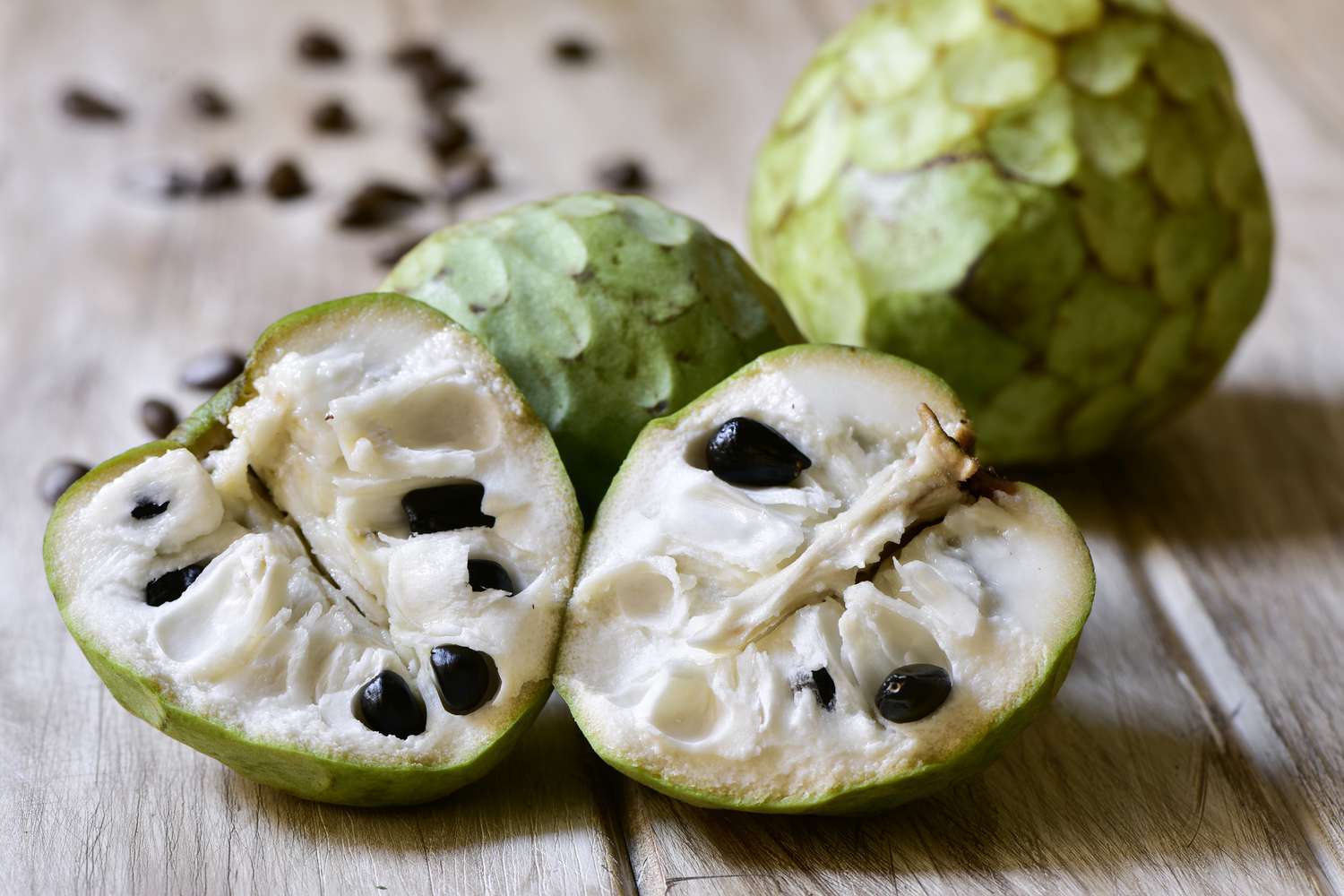
NUTRITION VALUE PER 100GRAM
Raw Cherimoya fruit is 79% water, 18% carbohydrate, 2% protein, and 1% fat. In a 100 gram reference amount providing 75 calories. Cherimoya is a rich source (20% or more of the Daily Value, DV) of vitamin B6 and a moderate source (10–19% DV) of vitamin C, dietary fiber, and riboflavin.
- Energy: 313 kJ (75 kcal)
- Carbohydrates: 17.71 g
- Sugars: 12.87
- Dietary fiber: 3 g
- Fat: 0.68 g
- Protein: 1.57 g
- Water: 79.4 g
Vitamins
- Thiamine (B1): 0.101 mg, 8%DV†
- Riboflavin (B2): 0.131 mg, 10%DV†
- Niacin (B3): 0.644 mg, 4%DV†
- Pantothenic acid (B5): 0.345 mg, 7%DV†
- Vitamin B6: 0.257 mg, 15%DV†
- Folate (B9): 23 μg, 6%DV†
- Vitamin C: 12.6 mg, 14%DV†
- Vitamin E: 0.27 mg, 2%DV†
Minerals
- Calcium: 10 mg, 1%DV†
- Iron: 0.27 mg, 2%DV†
- Magnesium: 17 mg, 4%DV†
- Manganese: 0.093 mg, 8%DV†
- Phosphorusv26 mg, 2%DV†
- Potassiumv287 mg, 10%DV†
- Sodiumv7 mg, 0%DV†
- Zinc: 0.16 mg, 1%DV†
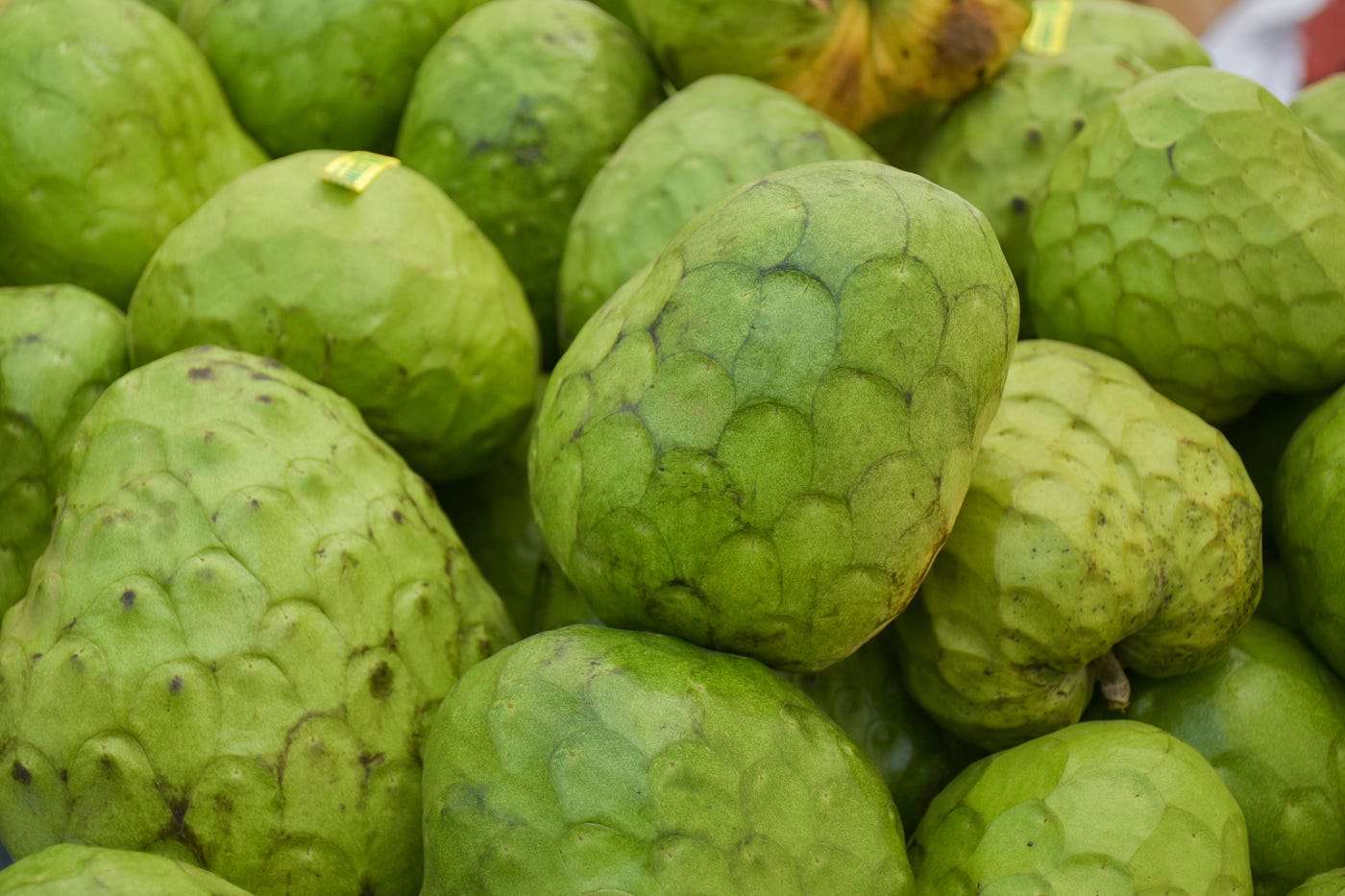
HEALTHY BENEFITS
The carotenoids, flavonoids, and vitamin C in custard apple support health and wellness in various ways. Here are some of the health benefits of Cherimoya:
1. Maintain healthy blood pressure
Cherimoya contains nutrients like potassium and magnesium that may help lower blood pressure. Eating foods rich in these minerals can help blood vessels relax, which improves blood circulation in your body. One fruit contains 674 milligrams of potassium and 40 milligrams of magnesium. Adults need 2,600-3,400 milligrams of potassium and 320-400 milligrams of magnesium daily (amount depends on age and sex).
2. Reduce the risk of cancer
The flavonoids and antioxidants in Cherimoya might also help lower your odds of getting cancer. These nutrients fight free radicals, molecules that are made naturally in the body in response to toxins like tobacco smoke and air pollution, and are linked to a higher risk of cancer.
3. Strengthen the immune system
Cherimoya are rich in vitamin C, which supports a healthy immune system. Getting the recommended daily amount of vitamin C can help your body fight off infections. One Cherimoya contains 32% of your recommended daily intake. The flavonoids and antioxidants in custard apple support your immune system, too.
4. Reduce inflammation
Free radicals are also thought to contribute to inflammatory diseases. Certain compounds in Cherimoya may help reduce inflammation. By reducing chronic inflammation, you may be able to lessen your risks of cancer, heart disease, arthritis, bowel diseases, and diabetes.
5. Support healthy digestion
Fiber helps support a healthy digestive system and can help lower your cholesterol and control blood sugar levels. High-fiber foods also make you feel fuller longer, which can be helpful for people who are trying to lose weight. A cup of Cherimoya contains 4.8 grams of fiber. You should get around 28 grams of fiber each day.
6. Maintain eye health
Cherimoya contains lutein, a carotenoid related to vitamin A and beta carotene. Lutein is found in your eyes, and getting more of it may help protect against conditions like age-related macular degeneration (AMD). Lutein also seems to protect against getting cataracts. A review of eight studies found that a high level of lutein in the blood was "significantly associated" with a lower risk of getting cataracts.
.jpg)
SIDE EFFECTS OF CHERIMOYA
Even though cherimoya offers impressive health benefits, it contains small amounts of toxic compounds.
Cherimoya and other fruits in the Annona species contain annonacin, a toxin that can affect your brain and nervous system.
In fact, observational studies in tropical areas link high consumption of Annona fruits to an increased risk of a specific type of Parkinson’s disease that does not respond to common medications.
All parts of the cherimoya plant may contain annonacin, but it’s most concentrated in the seeds and skin.
To enjoy cherimoya and limit your exposure to annonacin, remove and discard the seeds and skin before eating. If you are especially concerned about annonacin or have Parkinson’s disease or another nervous system condition, it may be best to avoid cherimoya.
Compiled and written by Crocus Media
Products
.jpg)
Chrysanthemum tea
Chrysanthemum tea is a herbal tea with bitter tastes, coolness, heat clearing, helps reduce acne, nourishes the body, cools the liver, detoxifies, curing neurasthenia, support cancer treatment, ... Chrysanthemum tea is made from 100% natural herbs, no preservatives, no flavoring, safe for health.
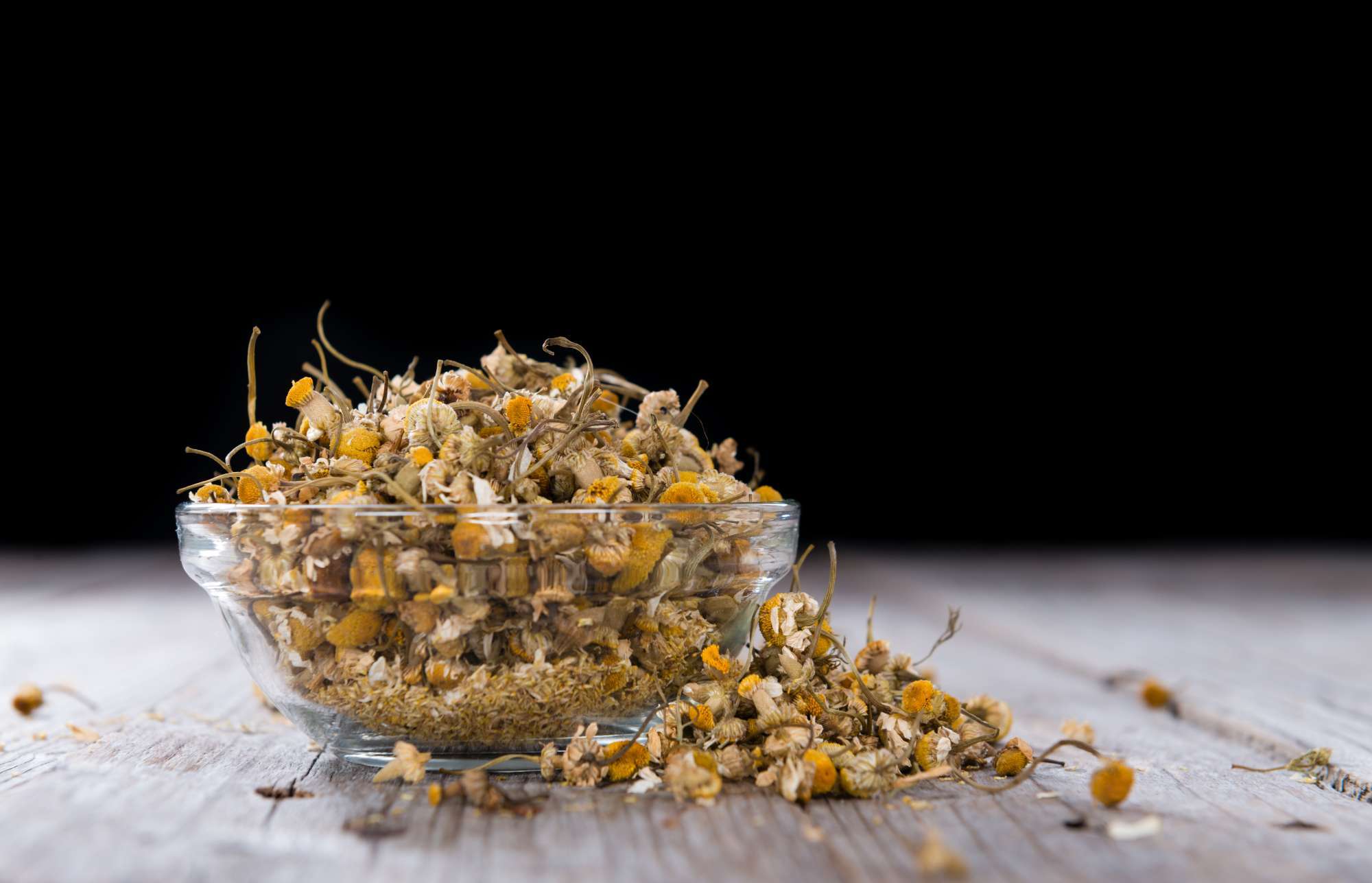
Chamomile tea
Chamomile tea has a mildly bitter taste and countless valuable health benefits such as Improves heart health, treats insomnia, controls blood sugar, reduces cancer risks, clears heat, detoxifies, lowers blood pressure,... Chamomile tea is made from 100% natural herbs, no preservatives, no flavorings, safe for health.
.jpg)
Rosa Centifolia tea
Dried Rose tea is selected from the budding rose buds. Natural aroma, easy to drink, has many health benefits such as supporting digestion, reducing stress, detoxifying, beautiful skin, helping to lose weight, slow aging,... Dried rose tea is made 100% from natural, no preservatives, no flavoring, safe for health.
